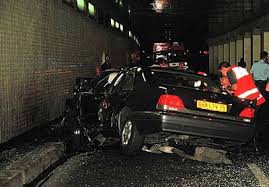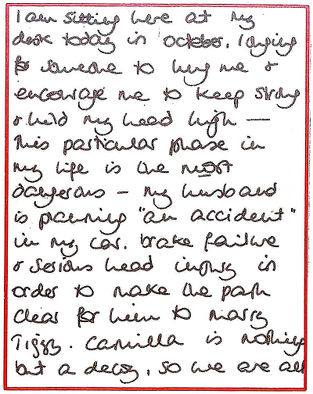Difference between revisions of "Diana Spencer/Premature death"
m (Moving videos more to top, added firefighter who spoke to her) |
|||
| (One intermediate revision by the same user not shown) | |||
| Line 18: | Line 18: | ||
}} | }} | ||
| − | + | ||
A jury, disallowed by the [[judge]] from returning a verdict of [[murder]], concluded that Diana, Princess of Wales had been "unlawfully killed".<ref name=bbc>http://news.bbc.co.uk/2/hi/uk_news/7328754.stm</ref><ref name=ug680>http://www.unwelcomeguests.net/680</ref> Like the jury's decision that [[Martin Luther King, Jr]] was [[assassinated]] as a result of a [[conspiracy]] involving unnamed agencies of the US government, this {{on}} has been obscured by the {{ccm}}, who portray the car crash in which Diana died as a simple accident. The [[BBC]] report from [[2008]] notes that the UK "[[Ministry of Justice]] confirmed it was not possible for the [[Crown Prosecution Service]] to prosecute foreign nationals for deaths abroad, even if the victim is British. All of the paparazzi involved were foreign." It chooses to conclude the story by highlighting a reader comment that "I hope for the sake of her family, this can finally be laid to rest".<ref name=bbc/> A [[2013]] BBC report entitled ''Is it OK to call someone a conspiracy theorist?'' stated that "38% of Britons believe Princess Diana's death was not an accident".<ref>http://www.bbc.co.uk/news/blogs-magazine-monitor-24442313</ref> | A jury, disallowed by the [[judge]] from returning a verdict of [[murder]], concluded that Diana, Princess of Wales had been "unlawfully killed".<ref name=bbc>http://news.bbc.co.uk/2/hi/uk_news/7328754.stm</ref><ref name=ug680>http://www.unwelcomeguests.net/680</ref> Like the jury's decision that [[Martin Luther King, Jr]] was [[assassinated]] as a result of a [[conspiracy]] involving unnamed agencies of the US government, this {{on}} has been obscured by the {{ccm}}, who portray the car crash in which Diana died as a simple accident. The [[BBC]] report from [[2008]] notes that the UK "[[Ministry of Justice]] confirmed it was not possible for the [[Crown Prosecution Service]] to prosecute foreign nationals for deaths abroad, even if the victim is British. All of the paparazzi involved were foreign." It chooses to conclude the story by highlighting a reader comment that "I hope for the sake of her family, this can finally be laid to rest".<ref name=bbc/> A [[2013]] BBC report entitled ''Is it OK to call someone a conspiracy theorist?'' stated that "38% of Britons believe Princess Diana's death was not an accident".<ref>http://www.bbc.co.uk/news/blogs-magazine-monitor-24442313</ref> | ||
| Line 50: | Line 50: | ||
Diana was removed, alive, from the wrecked car and was treated at the scene for 40 minutes. She did not have to be cut out of the car, although both Rees-Jones and Henri Paul did.<ref>http://www.coverups.com/princess-diana-death/princess-di-french.htm</ref> She was then driven slowly to [[hospital]].<ref>https://www.theguardian.com/uk/2007/nov/14/monarchy.davidbatty</ref> | Diana was removed, alive, from the wrecked car and was treated at the scene for 40 minutes. She did not have to be cut out of the car, although both Rees-Jones and Henri Paul did.<ref>http://www.coverups.com/princess-diana-death/princess-di-french.htm</ref> She was then driven slowly to [[hospital]].<ref>https://www.theguardian.com/uk/2007/nov/14/monarchy.davidbatty</ref> | ||
| − | Exposure== | + | ==Exposure== |
[[Victor Lewis-Smith]] produced a film, ''[[Unlawful Killing]]'', which focused on the irregular judicial procedures surrounded Diana's death.<ref>https://www.imdb.com/title/tt1979385/</ref> It was adapted for radio by ''[[Unwelcome Guests]]''.<ref name=ug680/> | [[Victor Lewis-Smith]] produced a film, ''[[Unlawful Killing]]'', which focused on the irregular judicial procedures surrounded Diana's death.<ref>https://www.imdb.com/title/tt1979385/</ref> It was adapted for radio by ''[[Unwelcome Guests]]''.<ref name=ug680/> | ||
Latest revision as of 18:50, 3 November 2023
 | |
| Date | 31 August 1997 |
|---|---|
| Location | Pont de l'Alma, Paris, France |
| Interest of | Garrick Alder, Victor Lewis-Smith, Laurence de Mello, John Morgan, Danny Nightingale |
| Description | A highly suspicious event. |
Diana Spencer, Princess of Wales, was in a car crash at around 12:23 a.m. on 31 August 1997, in Paris, France. She was officially declared dead at 4:05 a.m. that morning. Also killed in the vehicle were Dodi Fayed and their driver, Henri Paul. Her bodyguard, Trevor Rees-Jones survived the crash.
Contents
Official narrative
| Diana: The Night She Died [1] |
A jury, disallowed by the judge from returning a verdict of murder, concluded that Diana, Princess of Wales had been "unlawfully killed".[2][3] Like the jury's decision that Martin Luther King, Jr was assassinated as a result of a conspiracy involving unnamed agencies of the US government, this official narrative has been obscured by the commercially-controlled media, who portray the car crash in which Diana died as a simple accident. The BBC report from 2008 notes that the UK "Ministry of Justice confirmed it was not possible for the Crown Prosecution Service to prosecute foreign nationals for deaths abroad, even if the victim is British. All of the paparazzi involved were foreign." It chooses to conclude the story by highlighting a reader comment that "I hope for the sake of her family, this can finally be laid to rest".[2] A 2013 BBC report entitled Is it OK to call someone a conspiracy theorist? stated that "38% of Britons believe Princess Diana's death was not an accident".[4]
Background

The Mishcon Note
- Full article: The Mishcon Note
- Full article: The Mishcon Note
Victor Mishcon made a note, which confirms that Diana had reported that (unnamed) "reliable sources" had warned her that by April 1996 an attempt would be made on her life, possibly in a staged car crash. This was only revealed after a note in her handwriting to this effect was published in a UK newspaper.
Richard Tomlinson's claims
Richard Tomlinson, a former MI6 whistleblower, alleged that among the three options MI6 had explored for assassinating Slobodan Milosevic in 1992 was a staged car crash in a Geneva underpass tunnel[5], which he stated was an "alarming and very eerie similarity" to the manner of Diana's death.[6] Tomlinson further suggested that Henri Paul was passing information to MI6.[7] In 2008, Richard Dearlove denied that MI6 was involved in her death.[8]
The Crash
In 1999, a French investigation concluded the Mercedes had come into contact with another vehicle (a white Fiat Uno) in the tunnel.[9] The driver of that vehicle has never been traced, and the specific vehicle has not been identified.
Evidence
Various pieces of evidence suggest that Diana's death was suspicious.[10] An alcohol test suggested that the driver of the car must have drunk the equivalent of up to six more Ricards. However, the coroner said that CCTV footage and most witnesses suggested he showed no sign of being worse for wear.[11]
CCTV
No CCTV footage has been made available of the crash, for reasons which have not been clarified. One (anonymous) CCTV operator was quoted as saying that "Images would have been available if people wanted them to be. The truth is that every excuse possible was made to make sure that live film could be kept secret. This suited lots of powerful people, especially those who wanted to dismiss the crash as a simple traffic accident..." He suggested he was convinced that all available film was "rounded up and hidden or destroyed".[12]
Journey to hospital
| Firefighter who tried to save Diana reveals her final words. Notice how the firefighter says "“For me, it was an accident...... Now the cause, the reason for the accident, is something else" -
The Royal Family Channel |
Diana was removed, alive, from the wrecked car and was treated at the scene for 40 minutes. She did not have to be cut out of the car, although both Rees-Jones and Henri Paul did.[13] She was then driven slowly to hospital.[14]
Exposure
Victor Lewis-Smith produced a film, Unlawful Killing, which focused on the irregular judicial procedures surrounded Diana's death.[15] It was adapted for radio by Unwelcome Guests.[3]
Cover-up
The film Unlawful Killing was effectively banned in the UK and US.[3]
External links
Related Quotation
| Page | Quote |
|---|---|
| The Mishcon Note | “On 30 October 1995, Lord Mishcon attended a meeting with the Princess of Wales and her Private Secretary, Patrick Jephson. Following that meeting, Lord Mishcon prepared a handwritten note (Operation Paget - Exhibit VM/1). He wrote that the Princess of Wales had told him, that ‘reliable sources’ (whom she did not wish to name) had informed her that by April 1996, whether in an accident in her car such as a pre-prepared brake failure or by other means, efforts would be made if not to get rid of her, then at least to see that she was so injured or damaged as to be declared unbalanced. The Princess of Wales apparently believed that there was a conspiracy and that both she and Camilla Parker Bowles were to be ‘put aside’. Lord Mishcon told the Princess of Wales that if she really believed her life or being was under threat, security measures including those relating to her car must be increased. He did not believe that what she was saying was credible and sought a private word with Patrick Jephson, who to Lord Mishcon’s surprise, said that he ‘half believed’ the accuracy of her remarks regarding her safety.
On 18 September 1997, following the Princess of Wales’ death in Paris, Lord Mishcon met with the then Commissioner Sir Paul (now Lord) Condon and then Assistant Commissioner (now Sir) David Veness at New Scotland Yard (NSY), in order to bring the note to their attention. He read out the note (Operation Paget Exhibit VM/1) and emphasised that he was acting in a private capacity rather than on behalf of his firm or the Royal Family. A note of that meeting was produced (Operation Paget Exhibit VM/2). It details the then Commissioner’s view that the facts so far ascertained showed her death was the result of a tragic set of circumstances. The note concluded that if it ever appeared there were some suspicious factors to the crash in Paris, the Commissioner would make contact at a confidential level with Lord Mishcon or his firm. Lord Mishcon agreed with this course of action.” |
Related Documents
| Title | Type | Publication date | Author(s) | Description |
|---|---|---|---|---|
| File:The Big Breach.pdf | book | 2001 | Richard Tomlinson | Ex-MI6 officer Richard Tomlinson tells his story - of particular interest in what he has to say about the death of Diana Pricess of Wales. The UK authorites made strenuous efforts to prevent publication of the book and Tomlinson was subjected to serious harassment and terms of imprisonment |
| Document:Pulsed Strobe LTL Weapon at the London Ritz Hotel | webpage | 12 February 2002 | Joe Vialls |
References
- ↑ Diana: The Night She Died, Director/Writer: David Cohen
- ↑ a b http://news.bbc.co.uk/2/hi/uk_news/7328754.stm
- ↑ a b c http://www.unwelcomeguests.net/680
- ↑ http://www.bbc.co.uk/news/blogs-magazine-monitor-24442313
- ↑ http://www.duncancampbell.org/menu/journalism/theage/Sackedspy.pdf
- ↑ https://www.telegraph.co.uk/news/uknews/1578621/Princess-Diana-could-have-been-killed-by-MI6.html
- ↑ https://www.telegraph.co.uk/news/uknews/1578498/Diana-inquest-MI6-plotted-tunnel-murder.html
- ↑ https://www.telegraph.co.uk/news/uknews/1579233/Ex-MI6-head-We-did-not-assassinate-Diana.html
- ↑ Martyn Gregory Diana: The Last Days, Random House, 2010, p.70
- ↑ http://www.public-interest.co.uk/diana/
- ↑ http://www.serendipity.li/more/diana_murder.htm
- ↑ http://www.express.co.uk/news/uk/429557/DONAL-MACINTYRE-INVESTIGATION-Spies-taped-Diana-s-crash-and-bugged-her-phone
- ↑ http://www.coverups.com/princess-diana-death/princess-di-french.htm
- ↑ https://www.theguardian.com/uk/2007/nov/14/monarchy.davidbatty
- ↑ https://www.imdb.com/title/tt1979385/